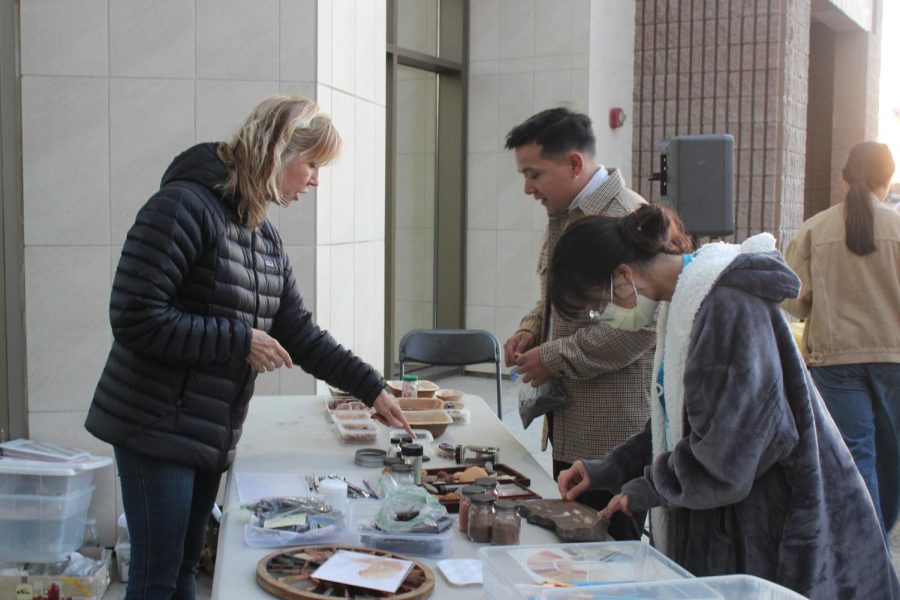CCEI hopes to highlight Indigenous People’s Heritage year round
November 15, 2022
In honor of Indigenous People’s Heritage Month, the Center for Cultural Engagement and Inclusion hosted an event honoring historical Indigenous storytelling and included a natural art workshop.
The event began with traditional Chumash storytelling by tribal elder and traditional storyteller Alan Salazar.
Salazar said his love for storytelling began when he was a child, as he would go down his street to listen to a friend, Mrs. Taylor, tell stories from her childhood in Hanford, California.
“I just became fascinated with listening to someone tell a good story that has a beginning, middle and an end,” Salazar said.
According to Salazar, storytellers like his father and Mrs. Taylor must use their words to draw pictures, which was what sparked his fascination with storytelling. Salazar has English ancestors and said that storytelling is still big and important over there.
“When you look at America, we were the same way, this country was built on storytellers,” Salazar said.
Salazar said that he has always identified as Indian since he has brown skin and Native American features, while also having some Portuguese, English and other European ancestors.
“I was born in 1951, and I went from kindergarten to high school and not once was native, Indigenous indians even mentioned, so I learned nothing about California Indians or any tribal people other than on Columbus Day,” Salazar said.
Salazar grew up in San Fernando, in the same area as his ancestors due to Mission San Fernando Rey de España being nearby. He was able to witness the city of San Fernando become one of the first cities in California to establish Indigenous People’s Day from Columbus Day in 2015.
“Going from being, to visible, to acknowledge is big, now if we can just get some of our land back,” Salazar said.
Salazar said that we need to get back to the focus and the purpose of storytelling rather than always believing celebrities, the media, and politicians.
“Within the tribal cultures, the storytellers are educators, knowledge keepers, so they share traditional beliefs,” Salazar said.
In order to solve a lot of our problems, Salazar said we must sit and listen to other people’s stories.
“It has been one of my goals to try and mentor young storytellers and the next generation of storytellers,” Salazar said.
Salazar said that Indigenous peoples’ true history is not being told and in America, it has become a tradition to not talk about the bad things that happened. He said that his generation wants true history to be told because there is so much that hasn’t been.
After the storytelling, artist and teacher Mona Lewis showed attendees how to make paint by using soil and rocks and mixing it with water. Attendees were encouraged by Lewis to interact with the natural environment they live in.
“Each rock has a different quality, some are chalky, some are oily, some are hard—some want to be painted right now, some don’t ever want to do it,” Lewis said.
Lewis said that each rock has a story to tell and if you are perceptive and patient, you can learn about how each one evolved, where you live and how you perceive the environment you live in.
“It’s surprising how many people don’t know that much about the tribes where they live. It’s important for us to be informed because that will help us in our social interaction with native people to understand what the actual history of the colonizers was,” Lewis said.
Lewis also said that it is important for Indigenous people to have a moment to be honored so we can be curious and try to learn a little bit more while connecting to them in a human-to-human way.
Programming student intern Allyson Macapagal said that California Lutheran University’s campus is located on the Chumash tribe’s ancestral land. She said it is important that we should be aware of and acknowledge the land that we are on.
“We really just want to celebrate Indigenous people because they are an underrepresented community,” Macapagal said.
Macapagal said that the CCEI and Cal Lutheran want to celebrate and acknowledge Indigenous people’s cultures because colonization has led to their cultures and languages being stripped away.
“We want to help revitalize that part of history,” Macapagal said.
Macapagal said that is CCEI’s goal and that the event was a drive towards a great start, and it will hopefully become more normalized to include more representation and celebration of Native American culture due to the campus being on Native American land.
Macapagal said that we need to walk this world with more empathy and a wider worldview of other people and their cultures. She also said it is important to preserve Indigenous people’s culture because, Macapagal said, we don’t want their cultures to go away.
Every Tuesday and Friday of November, the CCEI has been hosting tabling events around campus, showcasing a new community of Indigenous people each day that they want to highlight, acknowledge and educate people about.




















